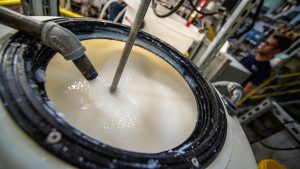
Forest Bioproducts Research Institute
By Daniel Timmermann
The University of Maine is home to a number of prestigious research centers and institutes working on the cutting edge of their research fields. Many were developed by and grew out of research projects brought to Maine through NSF’s Established Program to Stimulate Competitive Research (ESPCoR). One example of this is the Forest Bioproducts Research Institute (FBRI) at the University of Maine (UMaine) in Orono.
FBRI was launched by the 2006 NSF EPSCoR Track-1 grant Investing in Maine Research Infrastructure: Sustainable Forest Bioproducts. An important goal of the nearly 7.5-million-dollar grant was to create FBRI “to advance understanding about the scientific underpinnings, system behavior, and policy implications for the production of forest based bioproducts that meet societal needs… in an ecologically sustainable manner.”
Hemant Pendse, the director of FBRI who has been with UMaine since 1980 and was honored as the 2021 Distinguished Maine Professor, explained that collaboration among researchers in related disciplines predated the formation of FBRI and helped lead to the funding that established it. Prior to the 2006 Track-1 grant, “Chemical engineering researchers and pulp and paper researchers began working closely with researchers from what was then called the Advanced Engineering Wood Composite Center (now the Advanced Structures and Composites Center) and the UMaine School of Forest Resources,” Pendse recalled.
While other universities have researchers in similar fields, the interdisciplinary group of researchers working together in Maine were well positioned to study sustainable forest bioproducts, leading to the NSF EPSCoR grant awarded in 2006. “We have built our reputation on interdisciplinary work,” Pendse said, “It’s in our DNA. To have four groups of researchers working together in this way only happens in Maine, and that’s why everyone knows that UMaine is the place to go if you want to explore new ways to use wood.”
FBRI focusses on three main areas of research: fuels, chemicals, and advanced materials. The deliberately broad approach allows FBRI to vary and shift its work depending on need, interest, and advances in research. “A lot of credit goes to our initial vision and FBRI’s broad umbrella,” Pendse explained. “It serves us well as a foundational set of principles. We believe that our focus on fuels, chemicals, and advanced materials will serve us well for another ten years.”
Maine’s sustainably managed forests are one of the state’s most valuable natural resources, and FBRI is a vital partner to many wood suppliers and wood users across the state. The institute has embraced open collaboration and is a partner in the industry-led Forest Opportunity Roadmap Maine (FOR/Maine) effort to sustain and grow Maine’s existing and emerging forest products economy.
Pendse explained the philosophy, “We believe in open innovation and putting sufficient experimental materials into the private sector, as well as broadening understanding of how those materials can be used. We function as a proving ground to support industry as they explore new uses for forest bioproducts and our research, demonstration and development capacities can help companies gain confidence to implement new materials and technologies.”
 These are not empty platitudes. FBRI embraced public-private partnerships and built three pilot plants that can operate at an industrial scale. The pilot plants are able to take new and developing technologies from the lab bench and demonstrate them on an industrial scale to collect and share engineering data and key performance metrics. Nearing two decades since its inception, FBRI is a launch pad that drives research, industry, education, and economic development in Maine.
These are not empty platitudes. FBRI embraced public-private partnerships and built three pilot plants that can operate at an industrial scale. The pilot plants are able to take new and developing technologies from the lab bench and demonstrate them on an industrial scale to collect and share engineering data and key performance metrics. Nearing two decades since its inception, FBRI is a launch pad that drives research, industry, education, and economic development in Maine.
FBRI’s efforts to develop and help commercialize sustainable materials and technologies from wood meet a range of unique needs in Maine. In a state where a majority of households use fuel oil as their primary energy source for home heating, the institute has dedicated significant research to developing new fuel sources from forest bioproducts. FBRI aims to demonstrate that forest-based products can be manufactured at a commercial scale to replace fossil-fuel derived counterparts and inspire the creation of a small, commercial-scale biorefinery in Maine.

Seed funding from the Maine Technology Institute helped establish FBRI’s Technology Research Center (TRC) in Old Town, Maine, the hub of the institute’s wood-to-jet-fuel research program. While the name refers to jet fuel, this research program has broadened considerably thanks to ongoing support from the Defense Logistics Agency’s Energy Readiness Program (DLA ERP). Since 2015, DLA ERP has allocated nearly $23 million to support biofuels research at UMaine, and the FBRI research team is exploring a range of renewable fuel co-products including heating oil, diesel and even gasoline. In a major recent milestone, an oil refinery technical team is testing jet fuel made at UMaine to explore possible avenues for its use in commercial aviation.
Turning from fuels to advanced materials, the seat of FBRI research is the nanocellulose pilot plant, part of the University’s Process Development Center located in Jenness Hall on the UMaine campus. The pilot plant is capable of churning out two tons of nanocellulose per day, using not only pulp, but also wood particles and non-woody plants. The center distributes the material to researchers around the world to advance public and private R&D aimed at finding new commercial uses for this abundant, renewable, biodegradable substance. At UMaine, researchers affiliated with FBRI are exploring how nanocellulose can be used in a range of different materials from construction products to packaging, and researchers in other disciplines, including aquaculture, are innovating with the material in unique ways.
“Early on, we were using nanocellulose primarily as an additive for product enhancement,” said Pendse. “Thanks to our production infrastructure, process innovations, and strategic recruitment, UMaine has become a true leader in this research area and we’re now reaching into the development of novel nanocellulose composites.”
When it comes to chemicals FBRI is active in converting wood into platform chemicals that can be economically transformed into a wide range of specialty chemicals. For example, levulinic acid, one of the top platform chemicals that is currently being produced and purified at TRC, can be used for applications in personal care products and flavors and fragrances in wood additives.

FBRI continues to push research forward in part by recruiting talented faculty and researchers to Maine. As part of the initial EPSCoR grant, FBRI brought in Peter van Walsum (UMaine Associate Professor of Chemical and Biomedical Engineering) in 2007 and one year later Aaron Weiskittel (UMaine Professor of Forest Biometrics and Modeling). With FBRI, van Walsum develops bioprocessing fuels and chemicals that offer more sustainable and efficient solutions to Maine’s energy and industrial needs. Weiskittel builds models and forecasts to predict biomass growth and yield across Maine’s forests. Expanding on this work, Weiskittel currently leads two important research centers at UMaine, the Center for Advanced Forestry Systems and the Center for Research on Sustainable Forests.
Continuing to recruit talented researchers, FBRI hired Mehdi Tajvidi (UMaine Associate Professor of Renewable Nanomaterials) in 2013. Working with cellulose and nanomaterials, Tajvidi’s research focuses around the development of advanced materials like new coatings, packaging, and building products. In 2018, Ling Li (UMaine Assistant Professor of Sustainable Bioenergy Systems) joined FBRI and works to develop more efficient biomass energy and woody industry solutions. FBRI faculty and researchers have produced nearly a thousand publications, and hundreds of graduate and undergraduate students have earned their degrees while working with FBRI, learning from the institute’s faculty and researchers. One of those undergraduates was Tom Schwartz (UMaine Associate Professor of Chemical and Biomedical Engineering) who worked on FRBI’s Thermal Deoxygenation (TDO) reactor, which produces hydrocarbon fuels from biomass. After earning his Ph.D. in Chemical Engineering from the University of Wisconsin, Schwartz returned to Maine as a UMaine faculty member working with FBRI.
While the institute was established through the initial NSF EPSCoR grant, it has subsequently earned several million dollars in external grant funding and other contracts every year since. The 224 grants (from 2010 to 2021) awarded to FBRI, totaling over 64-million-dollars, speak to the quality of the institute’s leadership, faculty, researchers, and other personnel. It’s the people, their research, and their pursuit of new horizons that has brought in this funding, built Maine’s research capacity, and established Maine as a global leader in forest bioproducts.
FBRI is an exemplary example of what EPSCoR’s mission to enhance research competitiveness of states like Maine in STEM fields looks like when it is fully realized. As Pendse explained, unique conversations and collaborations around forest bioproducts were already taking place in Maine. NSF ESPCoR gave Pendse and the FBRI team the ability to build a world-class research center that leverages Maine’s natural resources to better the state, country, and globe.
